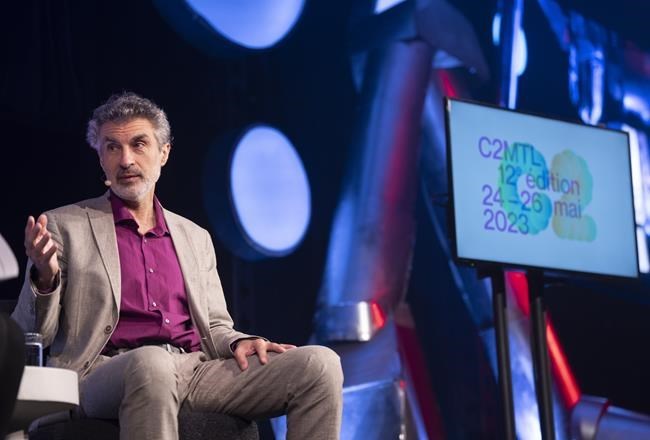OTTAWA — The federal government must move urgently to regulate artificial intelligence, says a top AI pioneer, warning the technology's current trajectory poses major societal risks.
Yoshua Bengio, dubbed a "godfather" of AI, told members of Parliament Monday that Ottawa should put a law in place immediately, even if that legislation is not perfect.
The scientific director at Mila, the Quebec AI Institute, says a "superhuman" intelligence that is as smart as a human being could be developed within the next two decades — or even the next few years.
"We’re not ready," Bengio said.
One short-term risk of AI is the use of deepfake videos to spread disinformation, he said. They use AI to make it look as though a public figure is saying something they didn't, or doing something that never happened.
The technology can also be used to interact with people through text or dialogue "in a way that can fool a social-media user and make them change their mind on political questions," said Bengio.
"There’s real concern about use of AI in politically oriented ways that go against the principles of our democracy."
A year or two down the road, the worry is that more-advanced systems can be used for cyberattacks.
AI systems are getting better and better at programming.
"When these systems get strong enough to defeat our current cyber defences and our industrial digital infrastructure, we are in trouble," Bengio said.
"Especially if these systems fall in the wrong hands."
The House of Commons industry committee where Bengio testified Monday is studying a Liberal government bill that would update privacy law and begin regulating some artificial intelligence systems.
The bill as it's drafted would give the government time to develop regulations, but Bengio says some provisions should take effect right away.
"With the current approach, it would take something like two years before enforcement (is) possible," he said.
One of the initial rules he said he wants to see implemented is a registry that would require systems with a specified level of capability to report to the government.
Bengio said that would put the responsibility and cost of demonstrating safety on large tech companies developing these systems, rather than on taxpayers.
Bill C-27 was first drafted in 2022 to target what are described as "high-impact" AI systems.
Bengio said the government should change the legislation's definition of "high-impact" to include technology that poses national security and societal threats.
That could include any AI systems that bad actors could use to design dangerous cyberattacks and weapons, or systems that find ways to self-replicate despite programming instructions to the contrary.
Generative AI systems like ChatGPT, which can create text, images and videos, emerged for widespread public use after the bill was first introduced.
The government says it plans to amend the legislation to reflect that.
Liberals say they aim to require companies beyond such systems to take steps ensuring the content they create is identifiable as AI-generated.
Bengio said it’s "very important to cover general-purpose AI systems because they’re also the ones that could be the most dangerous if misused."
Catherine Régis, a professor at the Université de Montréal, also said at the committee meeting Monday that the government needs to act urgently, citing recent "meteoric developments in AI, which we’re all familiar with."
Speaking in French, she pointed out that AI regulation is a global effort, and Canada must figure out what to do at the national level if it wants to have a voice.
"Decisions will be taken on a global scale that’ll have an impact on all countries," she said.
Establishing a clear and solid vision at the Canadian level is "one of the essential conditions to play a credible structuring and influential role in global governance."
This report by The Canadian Press was first published Feb. 5, 2024.
Anja Karadeglija, The Canadian Press




